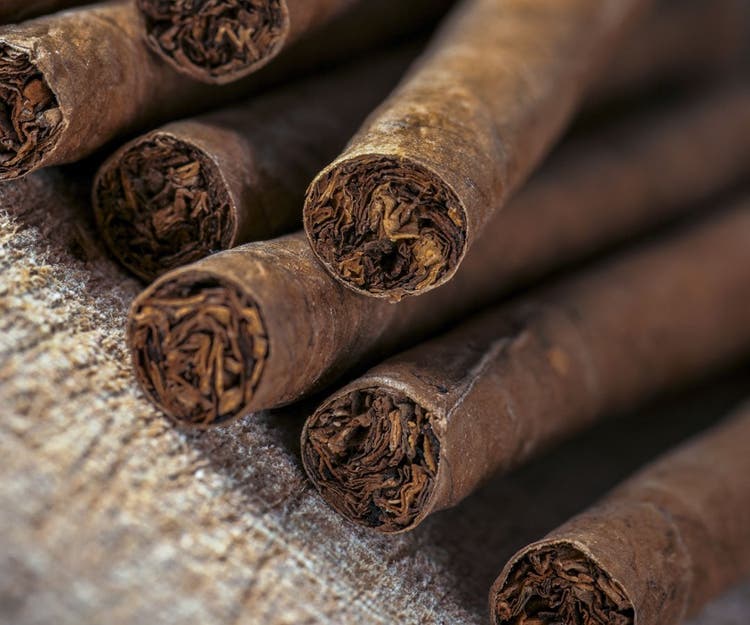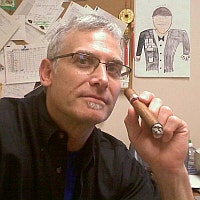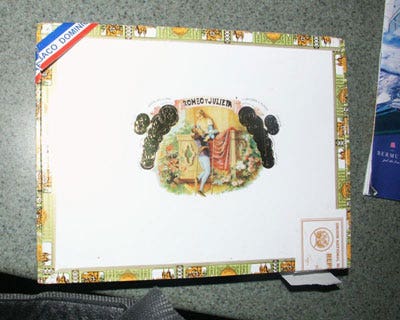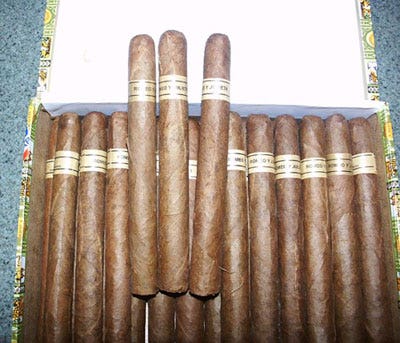
My “So-Called” Cuban Cigars

My reason for touching on this subject is that within the last several months, I’ve heard from two readers who were certain they had lucked into some wonderful Cuban cigars, only to learn from Yours Truly that they were not the real deal.
The first victim, Bob, wrote: “My daughter just returned from the Dominican Republic and brought me a box of Romeo & Julietas Churchills. The box was cello sealed, the 2 seals from Dominican Republic were on underneath the cello. I opened the box to find a very strange R & J label which says HABANA on them all. (Pictures attached.) What is this, Cuban cigars being exported illegally? Or just knock offs? I have smoked one and it is great, no complaints there. Just curious.”

“They are probably knock-offs. I can’t imagine why anyone would put real Cuban cigars in a Dominican marked box. The packaging nor the cigars appear to be from our Dominican Factory, TDG, which is the manufacturer for all RyJ cigars legal in the US.”
My assumption was, the clerk told her she was buying the Cuban version, and they put them in a Dominican-made box to get the Cuban cigars through US Customs. Since his daughter believed she was buying the genuine article, no harm no foul, but she probably overpaid for them. The good thing was that at least Bob liked the way they tasted, and he took it all in good spirit.
Then, just last month, I got an email from Cliff, who wrote that he had run across “a full box of Cuban Cohibas,” and even went so far as to send me two of them. One was an Espléndido and the other was an Ediciôn Limitada 2010. I figured I’d save the latter and lit up the Espléndido. It tasted fine to me; very smooth, mild, earthy, and I thought “Pretty good.” However, my colleague Hayward, scrutinized the bands and wasn’t satisfied that the cigars were authentic. So, I went to our “Master Tobacconist,” Jeff Brown (now manager of Leaf Cigar Bar & Restaurant), since in a former job he had spent a lot of time in Argentina and Cuba. After that Jeff traveled extensively between The Dominican Republic, Honduras and Nicaragua sampling and buying cigars for Famous Smoke Shop. I handed him the cigar and let him have a few puffs.

“You’re sure?”
“Oh yeah.”
I hated to do it, but I just had to write back to Cliff. “Please don’t shoot the messenger, but I (actually We),
believe that these Cohibas are counterfeits. The bands are wrong. I’m smoking the Churchill now and it tastes very good, but according to our master tobacconist, it’s not a Cuban, but more likely a Dominican. Now I am glad you sent these, but I just hope you didn’t overpay for them.”
Like Bob, Cliff took the message in stride, and now all’s well in Mudville.
If you’re ever in a store that sells “genuine” Cuban cigars, it’s in your best interest to have the clerk open the box before completing the sale, especially when buying cigars in the Caribbean and Mexico. You’ll have much better luck in Canada, and European countries like Germany, Switzerland, and the U.K. Though you may pay more, it’s more prudent to buy Cuban cigars from a genuine tobacconist or the duty-free shops at the airport.
In the long run, it’s safer to stay with websites and stores like Famous Smoke Shop that sell “legal” cigars at discount prices than to risk your money on what could possibly be something phony. Plus, I’m pretty confident that the embargo will be lifted in the not-too-distant future.
Finally, here are some useful links Hayward found that will help you identify authentic Cohibas and other Havana-made cigars.